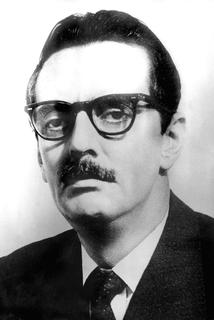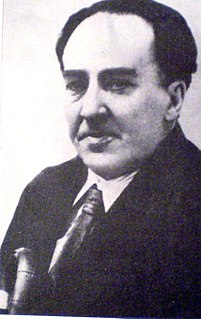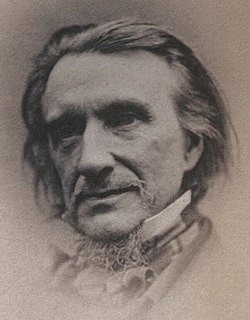A Quote by Alexander Pope
So man, who here seems principal alone, Perhaps acts second to some sphere unknown Touches some wheel, or verges to some goal; 'Tis but a part we see, and not a whole.
Related Quotes
Our lives are led, and our decisions made, within a network of needs and wants, some natural, some arising from the acts of others, some aggravated by the acts of the state. We are all bored, or threatened, or tantalized in differing degrees by a perilous world, some hostile people, and a not very sensitive government.
No one should be surprised at the difficulty of faith, if there is some part of his life where he is consciously resisting or disobeying the commandment of Jesus. Is there some part of your life which you are refusing to surrender at his behest, some sinful passion, maybe, or some animosity, some hope, perhaps your ambition or your reason? ... How can you hope to enter into communion with him when at some point in your life you are running away from him?
The afternoon is bright, with spring in the air, a mild March afternoon, with the breath of April stirring, I am alone in the quiet patio looking for some old untried illusion - some shadow on the whiteness of the wall some memory asleep on the stone rim of the fountain, perhaps in the air the light swish of some trailing gown.
But then Mason touches my neck, to the spot on it where the cut from that night has since healed, and I pull away. He was right, after all; it didn't leave a scar, though part of me wishes it had. At least I'd have some evidence, some justification of this permanence. Stains are even worse when you're the only one who can see them.
Many concerns now make part or the whole of their dividends from by-products that formerly went to waste. How do we, as individuals, utilize our principal by-product? Our principal by-product is, of course, our leisure time. Many years of observation forces the conclusion that a man's success or failure in life is determined as much by how he acts during his leisure as by how he acts during his work hours. Tell me how a young man spends his evenings and I will tell you how he is likely to spend the latter part of his life.
As the skies appear to a man, so is his mind. Some see only clouds there; some, prodigies and portents; some rarely look up at all; their heads, like the brutes,' are directed toward Earth. Some behold there serenity, purity, beauty ineffable. The world runs to see the panorama, when there is a panorama in the sky which few go to see.
Some of them [family names] have sentimental value for some reason or another, some of them just sound beautiful. Some of them are because of people that are meaningful to us in our lives. So it's hard to say which one we'll pick. Sometimes they say you have to see the child before you decide. So maybe when we see her we'll make a last-second decision.
Yet each man kills the thing he loves, By each let this be heard, Some do it with a bitter look, Some with a flattering word, The coward does it with a kiss, The brave man with a sword! Some kill their love when they are young, And some when they are old; Some strangle with the hands of Lust, Some with the hands of Gold: The kindest use a knife, because The dead so soon grow cold. Some love too little, some too long, Some sell, and others buy; Some do the deed with many tears, And some without a sigh: For each man kills the thing he loves, Yet each man does not die.
Children who wish to become good and great men or good and noble women, should try to know well all the people whom they meet. Thus they will find that there is no one who has not much of good; and when they see some great folly, or some meanness, or some cowardice, or some fault or weakness in another person, they should examine themselves carefully. Then they will see that, perhaps, they too have some of the same fault in themselves - although perhaps it does not come out in the same way - and then they must try to conquer that fault.
The Bible became the book of books, but it is not one document. It is a mystical library of interwoven texts by unknown authors who wrote and edited at different times with widely divergent aims. This sacred work of so many epochs and so many hands contains some facts of provable history, some stories of unprovable myth, some poetry of soaring beauty, and many passages of unintelligible, perhaps coded, perhaps simply mistranslated, mystery. Most of it is written not to recount events but to promote a higher truth—the relationship of one people and their God.






































